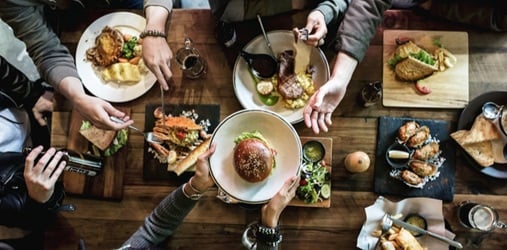
Workers’ compensation insurance for restaurants and other food businesses
Workers’ compensation insurance
Workers’ compensation insurance covers medical costs and lost wages for work-related injuries and illnesses. This policy is required in almost every state for businesses that have employees.
Workers' compensation protects your cooks, servers, bartenders, and cleaners
In a busy kitchen, cuts and burns are almost inevitable. An injury at a restaurant, bakery, or food truck can lead to an expensive hospital bill and time off work, which can mean tremendous financial losses.
Workers’ compensation insurance pays for an injured worker’s medical expenses and provides disability benefits during their recovery. It also protects sole proprietors from work-related injury costs that health insurance might deny.
Workers' compensation can help pay for an injured employee's:
- Immediate medical costs, such as an ambulance and emergency room visit
- Ongoing medical costs, such as medications and physical rehabilitation
- Partial lost wages for time spent recovering
Workers' comp protects food and beverage business owners
Typically included in your workers’ comp policy, employer’s liability insurance provides protection when an employee says you are liable for an injury and decides to sue.
Employer’s liability insurance can help cover:
- Attorney’s fees
- Court costs
- Settlements
Even if a lawsuit is frivolous, you could find yourself paying for a costly legal defense. That means it’s worth getting workers’ comp even if you consider your restaurant, bar, or catering business low-risk. In most states, it's also required by law if you have employees.
How to get workers' compensation insurance
Are we a drama-free bakery? Umm... What? What drama?
I don't just *feel* the cupcake.. I *am* the cupcake. (sigh)
What is this? Those are cupcakes. Yeah, thank you. Why is one of them half-eaten? I was hungry. Oh, you were a little hungry? What, you didn't have a lunch break? I didn't have time. Okay, stop yelling!
My job? I deliver pastries, and pastry-like items. But I'm really...an inventor. (Yelp)
Don't worry, you have workers' comp insurance. That protects you and your employees from accidents. Even when cream filling is involved.
Well, so much for swimming with the dolphins. (Dolphin noise)
Less drama. More treats! Get all the coverage your business needs by clicking this button. Protection is peace of mind...and a piece of cake.
How are workers' compensation costs calculated for restaurants and other food service businesses?
The amount you pay for workers’ compensation is a specific rate for every $100 of your business’s payroll. Your premium is determined by the type of work done by your employees (classification rate), your experience modification rate (claims history), and payroll (per $100).
The formula providers use in underwriting to calculate workers' comp rates is:

Workers’ comp requirements for restaurants and food service businesses depend on state laws
Each state sets its own laws for workers’ compensation requirements. For example, every restaurant in New York must carry workers’ compensation insurance for its employees – even part-time workers and family members. However, Alabama restaurants are only required to carry workers’ compensation when they have five or more employees.
Independent contractors, sole proprietors, and partners typically don’t have to carry workers’ compensation insurance, but you can purchase a policy to protect yourself, too. It's a good idea to carry this coverage for financial protection against work injuries, which health insurance might not cover.
Workers' compensation laws in your state

Monopolistic state funds for workers’ compensation
In certain states, restaurants, bars, and other food service businesses must purchase coverage through a monopolistic workers' comp state fund. Those states are:
If you purchase workers’ comp through a monopolistic state fund, it might not include employer’s liability insurance. However, you can purchase it as stop gap coverage from a private insurance company.

Lower your workers’ comp costs with food service risk management
Every day, your workers place themselves at risk. Kitchens, restaurants, and bars are full of opportunities for serious injury. More accidents mean more insurance claims – and that makes the cost of your insurance go up.
Whether you’re the owner of a restaurant, deli, or concession stand, you can control your business’s risks. By providing safety training to your employees, developing a safe work environment, and other techniques, you can reduce workplace injuries along with insurance rates.
How much does workers' compensation cost for food businesses?

Food and beverage businesses pay an average premium of about $106 per month for workers' compensation insurance, but you could pay more or less depending on your risks.
Insurance costs for food and beverage businesses are based on a few factors, including:
- Type of food and beverage business
- Business equipment and property
- Revenue
- Location
- Number of employees
Other important policies to consider
Workers’ compensation offers protection in the event of an employee injury, but it doesn’t cover every risk. Owners of food and beverage businesses should also consider:
Business owner’s policy (BOP): A BOP defends against the most common risks in the food service industry. It bundles general liability insurance with commercial property insurance at a lower rate than purchasing both policies separately.
General liability insurance: This policy protects against common risks, such as customer injury or damage to customer property. It’s often a requirement for a commercial lease.
Commercial auto insurance: This policy can cover expenses related to accidents involving your work vehicle. Most states require this coverage for vehicles owned by a business.
Liquor liability insurance: This policy covers risks involved with serving alcohol, such as an intoxicated customer damaging another customer’s property or causing an injury.
Cyber liability insurance: Cyber insurance helps food and beverage businesses recover financially from cyberattacks and data breaches.

Get free quotes and buy online with Insureon
Are you ready to safeguard your food service business with workers’ compensation or another type of insurance? Complete Insureon’s free online application to compare quotes from top U.S. carriers. Once you find the right policy, you can begin coverage in less than 24 hours.
Verified workers' compensation insurance reviews

Want free expert advice right in your inbox?
By entering your email address and subscribing, you agree to our Terms of Use and Privacy Policy

























